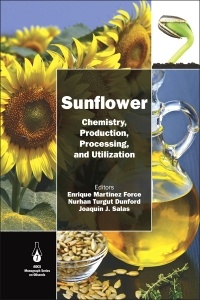Description
Sunflower
Chemistry, Production, Processing, and Utilization
Coordinators: Martínez-Force Enrique, Dunford Nurhan T., Salas Joaquín J.
Language: English
Subjects for Sunflower:
728 p. · 15x22.8 cm · Hardback
Description
/li>Contents
/li>Biography
/li>Comment
/li>
Chapter 2 Mutagenesis in Sunflower
Chapter 3 Sunflower Crop Physiology and Agronomy
Chapter 4 Sunflower Diseases
Chapter 5 Sunflower Broomrape (Orobanche cumana Wallr.)
Chapter 6 Sunflower Insect Pests
Chapter 7 Sunflower Bird Pests
Chapter 8 Sunflower Seed Preparation and Oil Extraction
Chapter 9 Oil Refining
Chapter 10 Sunflower Oil and Lipids Biosynthesis
Chapter 11 Sunflower Oil Minor Constituents
Chapter 12 Sunflower Proteins
Chapter 13 Utilization of Sunflower Proteins
Chapter 14 Food Uses of Sunflower Oils
Chapter 15 Oxidative Stability of Sunflower Seed Oil
Chapter 16 U.S. and Canada Perspectives on Sunflower Production and Processing
Chapter 17 South America Perspectives on Sunflower Production and Processing
Chapter 18 Sunflower Production in the European Union
Chapter 19 Eastern Europe Perspectives on Sunflower Production and Processing
Chapter 20 Asia and Australia Perspectives on Sunflower Production and Processing
.
Dr. Dunford’s experience as an engineer and scientist encompasses over 30 years, including positions in Turkey, Canada, and the United States. She is currently a professor at Oklahoma State University in the Biosystems and Agricultural Engineering Department. Dr. Dunford is also on staff at the Robert M. Kerr Food and Agricultural Products Center as the oil and oilseed specialist. She has a BS in chemical engineering, MS in chemistry, Master of Engineering in Food Process Engineering and a Ph.D. in Food Processing/Engineering. She is a registered professional engineer and a certified food scientist, and she is active in several professional organizations including AOCS and IFT in the United States.
Dr. Dunford is internationally known for her research in food, oil, oilseed, microalgae, and bioprocessing. Her research focuses on improving existing and developing new bioprocessing technologies, examining potential of nonfood biomass as biofuel and bioproduct feedstocks, and advancing utilization of byproducts and waste streams for biofuel production and value-added product development. She has established herself as a leading expert in utilization of environmentally benign techniques for edible oil processing focusing on extraction
- Presents seven chapters on improving sunflower production with insights on breeding and genetics; physiology and agronomy; common insect and bird pests; mutagenesis; and identifying and preventing diseases.
- Summarizes current knowledge of sunflower oil uses in food, oxididative stability, minor constituents, and lipids biosynthesis.
- Ideal reference for scientists, researchers, and students from across industry, academia, and government.




